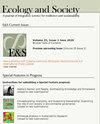在科学、政策、实践和参与的“解决方案”中驾驭邪恶的水治理
IF 3.2
2区 社会学
Q1 ECOLOGY
引用次数: 4
摘要
. 世界各地的许多水可持续性和治理问题都可以被视为棘手的问题,因此,即使解决方案非常广泛和全面,也可能因为高度复杂性、不确定性和观点分歧而受到争议。因此,这些类型的问题及其争论创造了一个复杂的可能解决方案景观,我们称之为水治理的“解决方案景观”。我们发展了解决方案景观的概念,通过强调四个主要方面来确定不同类型的解决方案:科学、政策、实践和参与。在通过文献综述首先考虑了这四个维度之后,我们将解决方案的表达概念化,包括六种不同的解决方案路径。这些是全面的解决方案,所有四个方面都得到同等的支持和整合;笨拙的解决方案,在没有协调的情况下单独追求多个解决方案(有矛盾的风险);两种权宜之计(高成本和低成本),包括试图快速追求结果;解决方案主义,指的是过分强调一个维度,试图提供一个快速解决方案(导致意想不到的后果);最后是反解决方案,即一个或多个维度受到政策制定者的积极争议或忽视。本文以南非为例说明了该框架的关键组成部分。然后,我们讨论了解决方案主义在解决棘手的水问题方面的吸引力,以及如何在考虑经常隐藏的制度过程和权力的情况下设想替代方案。最后,我们认为解决方案景观的价值是一种综合启发式工具,用于讨论恶劣的水问题,认识到利益相关者之间的多元视角和权力不对称等问题。本文章由计算机程序翻译,如有差异,请以英文原文为准。
Navigating wicked water governance in the “solutionscape” of science, policy, practice, and participation
. Many water sustainability and governance issues around the world can be viewed as wicked problems, whereby a solution, even if quite broad and comprehensive, may be contested because of high complexity, uncertainty, and diverging perspectives. These types of issues and their contestation thus create a complex landscape of possible solutions, which we term a water governance “solutionscape.” We develop the concept of the solutionscape to identify different types of solutions that present themselves through the emphases placed upon four major dimensions: science, policy, practice, and participation. After first considering these four dimensions via a literature review, we then conceptualize the solutionscape’s expressions comprising six different solution pathways. These are comprehensive solutions, where all four dimensions are equally supported and integrated; clumsy solutions, where multiple solutions are pursued separately without coordination (risking contradictions); two types of expedient solutions (high and low-cost), which involve attempts to pursue outcomes rapidly; solutionism, which refers to the over-emphasis of one dimension in an attempt to provide a quick-fix (leading to unintended consequences); and finally anti-solutions, whereby one or more dimensions are actively disputed or disregarded by policy makers. An example from South Africa is used to illustrate the framework’s key components. We then discuss the allure of solutionism in solving wicked water problems, and how alternatives might be envisaged with the consideration of often-hidden institutional processes and power. Finally, we consider the value of the solutionscape as an integrative heuristic tool to discuss wicked water problems, recognizing issues such as plural perspectives and power asymmetries between stakeholders.
求助全文
通过发布文献求助,成功后即可免费获取论文全文。
去求助
来源期刊

Ecology and Society
环境科学-生态学
CiteScore
6.20
自引率
4.90%
发文量
109
审稿时长
3 months
期刊介绍:
Ecology and Society is an electronic, peer-reviewed, multi-disciplinary journal devoted to the rapid dissemination of current research. Manuscript submission, peer review, and publication are all handled on the Internet. Software developed for the journal automates all clerical steps during peer review, facilitates a double-blind peer review process, and allows authors and editors to follow the progress of peer review on the Internet. As articles are accepted, they are published in an "Issue in Progress." At four month intervals the Issue-in-Progress is declared a New Issue, and subscribers receive the Table of Contents of the issue via email. Our turn-around time (submission to publication) averages around 350 days.
We encourage publication of special features. Special features are comprised of a set of manuscripts that address a single theme, and include an introductory and summary manuscript. The individual contributions are published in regular issues, and the special feature manuscripts are linked through a table of contents and announced on the journal''s main page.
The journal seeks papers that are novel, integrative and written in a way that is accessible to a wide audience that includes an array of disciplines from the natural sciences, social sciences, and the humanities concerned with the relationship between society and the life-supporting ecosystems on which human wellbeing ultimately depends.
 求助内容:
求助内容: 应助结果提醒方式:
应助结果提醒方式:


